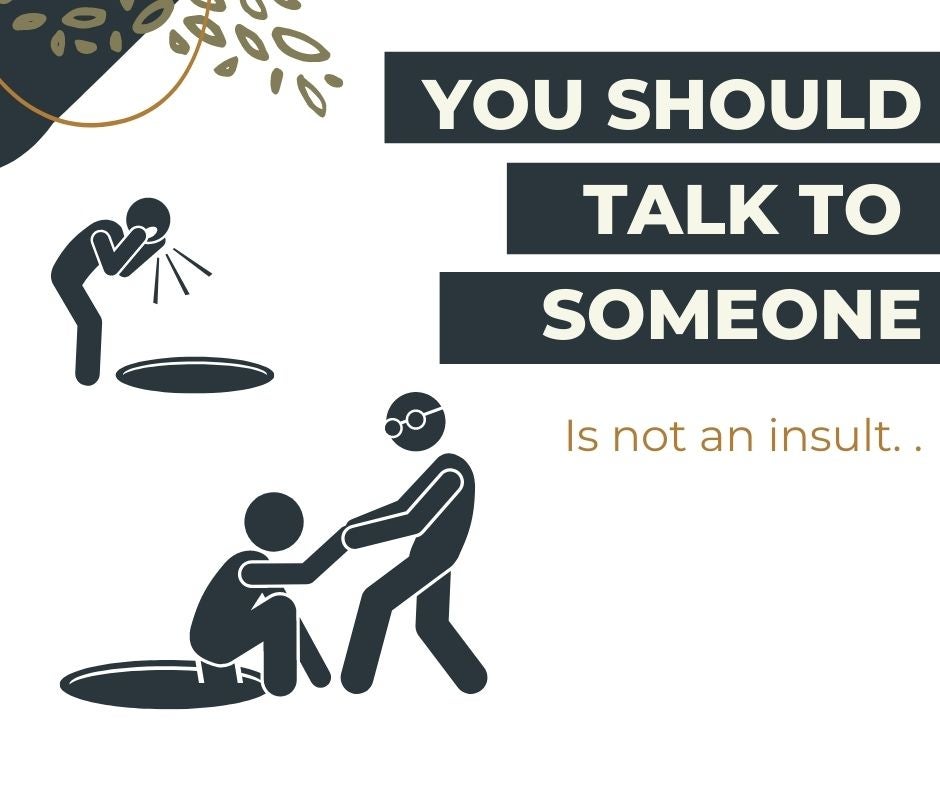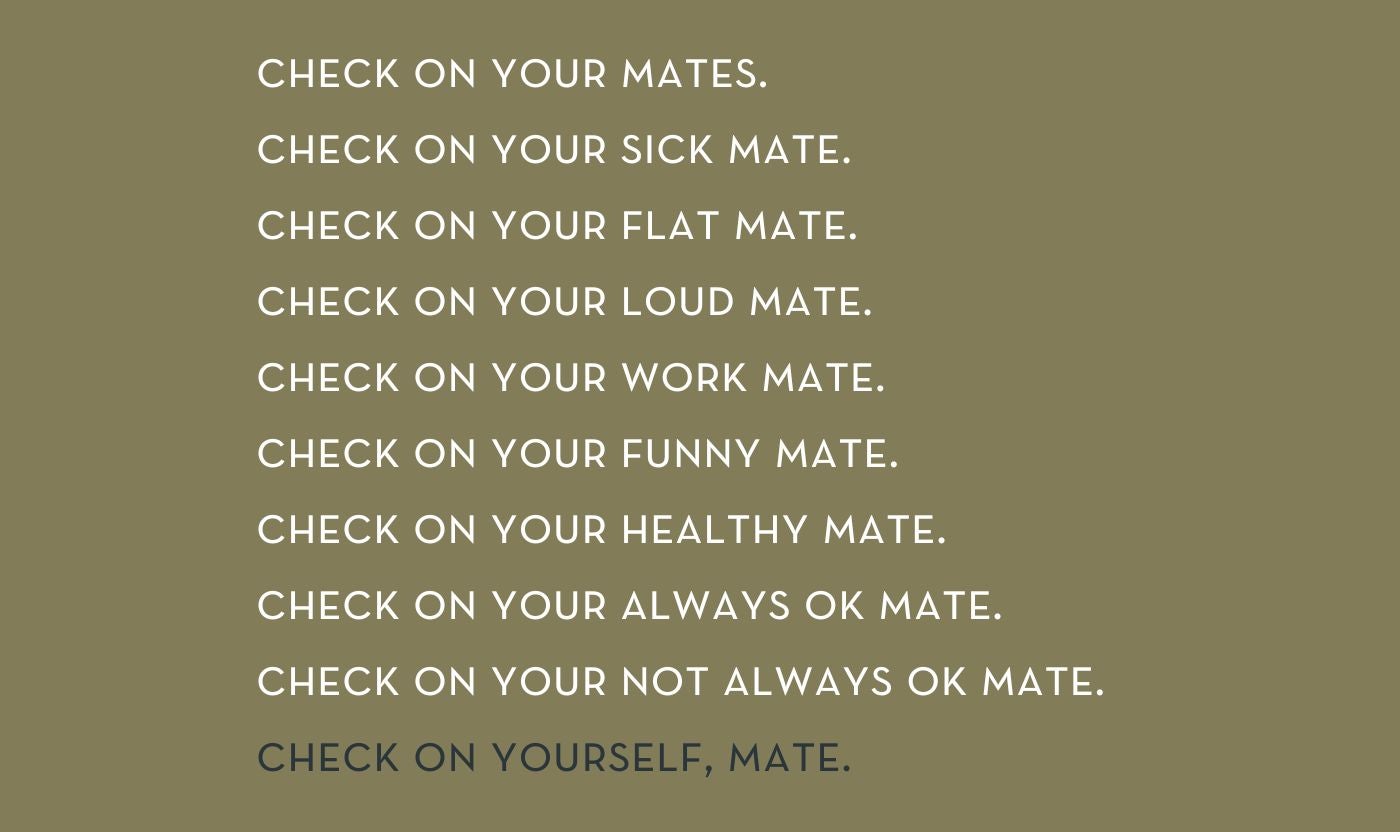
You've probably seen the movements and taglines supporting mental health awareness - "check on your mates", "R U OK?", "mental health is health", "mental health awareness month", "heart on my sleeve" and "it's ok to not be okay". These movements are encouraging more and more people to reach out to friends and have conversations about mental health - but why is it so hard to do? Even when you really believe it's the right thing to do?
If you feel worried about having these check-ins or talking to a friend or family member about getting support - you are not alone. There are number of contributing factors: the lingering stigma around the topic of mental health, hesitancy with vulnerability, the fear of giving bad advice, conflict avoidance, and more. All of these factors contribute to making this conversation feel potentially awkward or in the worst case - insulting.
The number 1 tip? Don't let fear win, if you think it's a conversation worth having, have it.
Read on for our top 5 tips for how to approach these conversations with respect, care, and purpose.
1. Check in with yourself

Before starting the conversation, check-in. What are your intentions in having this conversation? What would be the best outcome? Where would you want to bring this up? Can you help support with next steps?
Sometimes supporting someone you care about when they don't seem themselves can be challenging. Make sure you are approaching this conversation from a place of love and compassion and not a reaction out of frustration or judgement. While you don't want to overthink it - make sure you have the time to listen, are in a good headspace yourself, and have a plan for how to help.
2. Approach with care

There is no script to memorise. You know your relationship and have your own rapport, but there are a few ways to approach with care. Namely starting the conversation with the fact they you love them, care about them and what you appreciate about them. You are setting a tone of respect and encouragement and reminding the person that you know them well.
3. Put it plainly

When nervous or uncomfortable it may be tempting to dance around a topic or talk in euphemisms. While you are only trying to be polite, your comfort level and confidence in the idea of going to therapy or talking to a psychologist also helps break the stigma. When you are comfortable saying "I think it would be really beneficial to talk to a psychologist" it helps confirm that it's nothing to get uncomfortable or embarrassed about.
Talking to a psychologist for the first time can be intimidating, but also incredibly motivating. It's common to wonder 'what do you talk about with a psychologist?', 'does talking to a psychologist help?' or whether certain concerns warrant talking to a psychologist. There are a number of reasons someone seeks professional support from more mild to more complex. If you have had positive personal experiences with seeing a psychologist that can also be really encouraging and motivating to share. Chances are some of the reasons you love talking to a psychologist rather than a friend may resonate. When sharing your own experiences be mindful of still holding space for the other person to share and not shifting too much focus to yourself or your story.
4. Address the barriers
Sometimes someone may want to see a psychologist or knows they would benefit, but haven't had the chance due to barriers be it - cost, geography, finding the right psychologist, or scheduling regularly. In this case a supportive friend who can help with the logistics can make a big difference. Talking to a psychologist online can be a great way to address these barriers - we've broken down some of these barriers and how to help:
- Finding the right psychologist: Building rapport can take time but it's important to find a psychologist who can support your goals and match your schedule. You can offer to help them find the right psychologist. You are also welcome to link them to our unique matching tool. This tool helps to find the most suitable match among our experienced team of AHPRA registered psychologists all based in Australia. Many are available within 48hrs to get started.
- Geography: If you live in a region with low access to psychologists it may be difficult to find someone to see face to face. Talking to a psychologist online is a great option as they can have a session from the comfort & privacy of home or wherever they feel most comfortable.
- Scheduling: For those managing shift work, parenting, or without easy transport access finding the right time to commute and go to a session can be an issue. We are able to support a wide range of availability with My Mirror with psychologists available on weekends, after standard work hours, or throughout the day.
- Costs: Prohibitive costs are another area that can be a barrier. Did you know Australians have access to medicare rebates to reduce the cost of seeing a psychologist? To access rebates you must see a GP to obtain a referral letter and mental healthcare plan. Please see our medicare page with helpful information to make this process as easy to understand as possible.
5. Accept what you can't control and look after yourself too

Keep in mind, someone may not be ready to take this step in their journey. All you can do is encourage them and be supportive. Remember to take care of yourself as well and if you feel you need to talk to a psychologist to better cope with supporting someone close to you that is always an option as well.
What if they are not ok and it's a more pressing concern?
If the conversation starts to feel outside what you feel comfortable managing or your capabilities to support you can call a crisis support service like Lifeline on 13 11 14 for immediate support and advice. If you believe someone’s life is in danger call 000.
